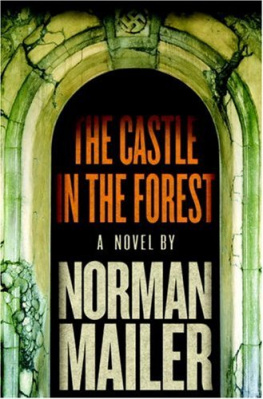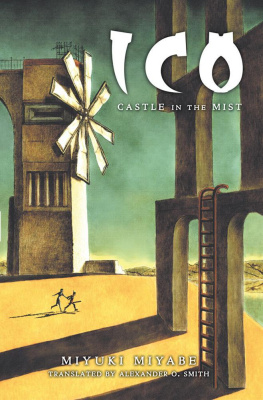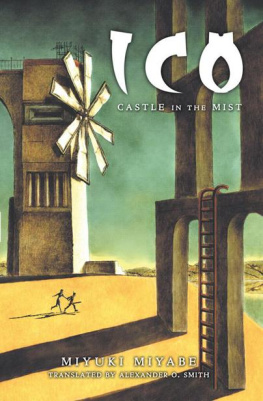In the morning, the old general spent a considerable time in the wine cellars with his winegrower inspecting two casks of wine that had begun to ferment. He had gone there at first light, and it was past eleven oclock before he had finished drawing off the wine and returned home.
Between the columns of the veranda, which exuded a musty smell from its damp flagstones, his gamekeeper was standing waiting for him, holding a letter.
What do you want? the General demanded brusquely, pushing back his broad-brimmed straw hat to reveal a flushed face. For years now, he had neither opened nor read a single letter. The mail went to the estate managers office, to be sorted and dealt with by one of the stewards.
It was brought by a messenger, said the gamekeeper, standing stiffly at attention. The General recognized the handwriting. Taking the letter and putting it in his pocket, he stepped into the cool of the entrance hall and, without uttering a word, handed the gamekeeper both his stick and his hat. He removed a pair of spectacles from his cigar case, went over to the window where light insinuated itself through the slats of the blinds, and began to read.
Wait, he said over his shoulder to the gamekeeper, who was about to leave the room to dispose of cane and hat.
He crumpled the letter into his pocket. Tell Kalman to harness up at six oclock. The Landau, because theres rain in the air. And he is to wear full-dress livery. You too, he said with unexpected force, as if suddenly angered. Everything must shine. The carriage and harness are to be cleaned immediately. Then put on your livery, and seat yourself next to Kalman on the coach-box. Understood?
Yes, Excellence, said the gamekeeper, looking his master directly in the eye. At six oclock.
At half past six you will leave, said the General, and then appeared to be making some calculation, for his lips moved silently. You will go to the White Eagle. All you are to say is that I have sent you, and the carriage for the Captain is waiting.
Repeat.
The gamekeeper repeated the words. Then the General raised his hand, as if he had just thought of something else, and he looked up at the ceiling but didnt say anything and went upstairs to the second floor.
The gamekeeper, still frozen to attention, watched him, unblinking, and waited until the thickset, broad-shouldered figure disappeared around the turn of the stone balustrade.
The General went into his room, washed his hands, and stepped over to his high, narrow standing desk; arranged on its surface of unstained green felt were pens, ink, and a perfectly aligned stack of those notebooks covered in black-and-white-checked oilcloth commonly used by schoolchildren for their home-work. In the middle of the desk stood a green-shaded lamp, which the General switched on, as the room was dark.
On the other side of the closed blinds, in the scorched, withered garden, summer ignited a last blaze like an arsonist setting the fields on fire in senseless fury before making his escape. The General took out the letter, carefully smoothed the paper, set his glasses on his nose and placed the sheet under the bright light to read the straight short lines of angular handwriting, his arms folded behind his back.
There was a calendar hanging on the wall. Its fist-sized numbers showed August 14. The General looked up at the ceiling and counted: August 14.
July 2. He was calculating how much time had elapsed between that long-ago day and today. Forty-one years, he said finally, half aloud.
Recently he had been talking to himself even when he was alone in the room. Forty years, he then said, confused, and blushed like a school-boy whos stumbled in the middle of a lesson, tilted his head back and closed his watering eyes. His neck reddened and bulged over the maize-yellow collar of his jacket. July 2, 1899, was the day of the hunt, he murmured, then fell silent. Propping his elbows on the desk like a student at his studies, he went back to staring anxiously at the letter with its brief handwritten message. Forty-one, he said again, hoarsely. And forty-three days. Yes, exactly.
He seemed calmer now, and began to walk up and down. The room had a vaulted ceiling, supported by a central column. It had once been two rooms, a bedroom, and a dressing room.
Many years ago-he thought only in decades, anything more exact upset him, as if he might be reminded of things he would rather forget-he had had the wall between the two rooms torn down. Only the column holding up the central vault remained. The castle had been built two hundred years earlier by an army supplier who sold oats to the Austrian cavalry and in course of time was promoted to the nobility. The General had been born here in this room.
In those days the room farthest back, the dark one that looked onto the garden and estate offices, had been his mothers bedroom, while the lighter, airier room had been the dressing room.
For decades now, since he had moved into this wing of the building, and torn down the dividing wall, this large, shadowy chamber had replaced the two rooms. Seventeen paces from the door to the bed. Eighteen paces from the wall on the garden side to the balcony. Both distances counted off exactly. He lived here as an invalid lives within the space he has learned to inhabit. As if the room had been tailored to his body. Years passed without him setting foot in the other wing of the castle, in which salon after salon opened one into the next, first green, then blue, then red, all hung with gold chandeliers.
The windows in the south wing gave onto the park with its chestnut trees that stood in a semicircle in front of protruding balustrades held up by fat stone angels, and bowed down over the balconies in spring in all their dark-green magnificence, lit with pink flowering candles. When he went out, it was to the cellars or into the forest or-every morning, rain or shine, even in winter-to the trout pond. And when he came back, he went through the entrance hall and up to his bedroom, and it was here that he ate all his meals.
So hes come back, he said aloud, standing in the middle of the room.
Forty-one years and forty-three days later. These words seemed suddenly to exhaust him, as if he had only just understood the enormousness of forty one years and forty-three days. He swayed, then: down in the leather armchair with its worn back. C the little table within reach of his hand was a little silver bell, which he rang.
Tell Nini to come up here, he said to the servant. And then, politely, If shed be so kind.
Nini was ninety-one years old. She came at once. rocked the General in his cradle in this room-had stood in this room as the General was. She had been sixteen then, and very beautiful. Small, but so well-muscled and calm that her, possessed of a secret, as if her bones, her blood concealed within them some essence, secret that could neither be told nor translated into any language, since it words. She was the daughter of the village postmaster, she was sixteen when she gave birth to a child, and no one ever discovered the identity of the father. When her father beat her and threw her out of the house, she came to the castle and suckled the newborn child, because her milk was plentiful.
She came with no possessions other than the dress on her back and a lock of hair, tucked in an envelope, from her dead baby. That was how she presented herself at the castle. She came in time for the birth. The General had his first taste of milk at Ninis breast.
So she lived in the castle silently for seventy-five years. Silent and smiling. Her name flew through the rooms as if the inhabitants of the castle were trying to draw one anothers attention to something. Nini,
they said, as if to say, How extraordinary that theres more in the world than egoism, passion, vanity. Nini And because she was always in the right place, nobody ever saw her; and because she was always good-humored, nobody ever asked her how it was that she could always be good-humored when the man she loved had abandoned her and the child who should have drunk her milk was dead. She suckled the General and raised him, and seventy-five years went by. From time to time the sun shone over the castle and the family, and at such moments of universal well-being people were surprised to notice that Nini was smiling too.













